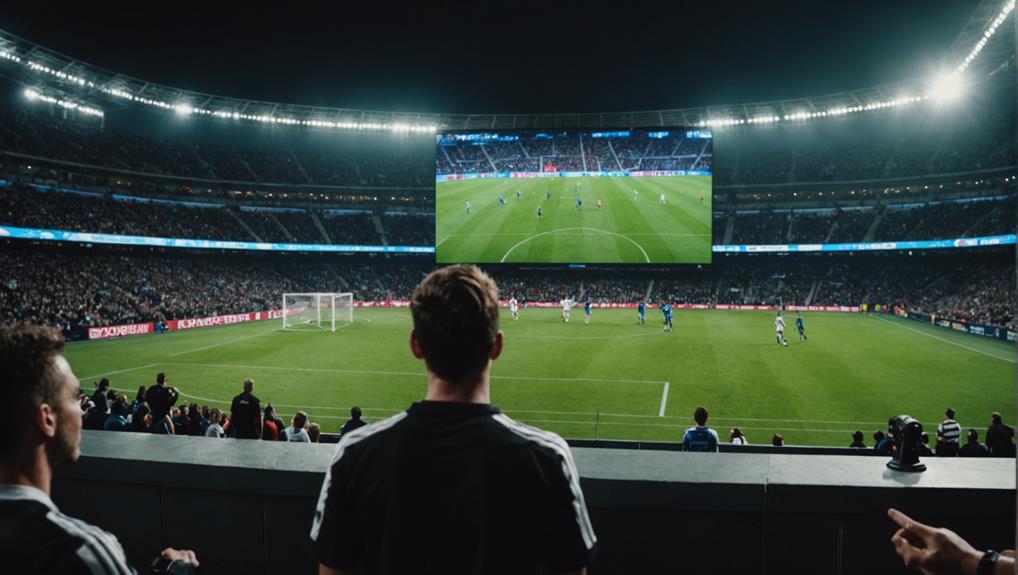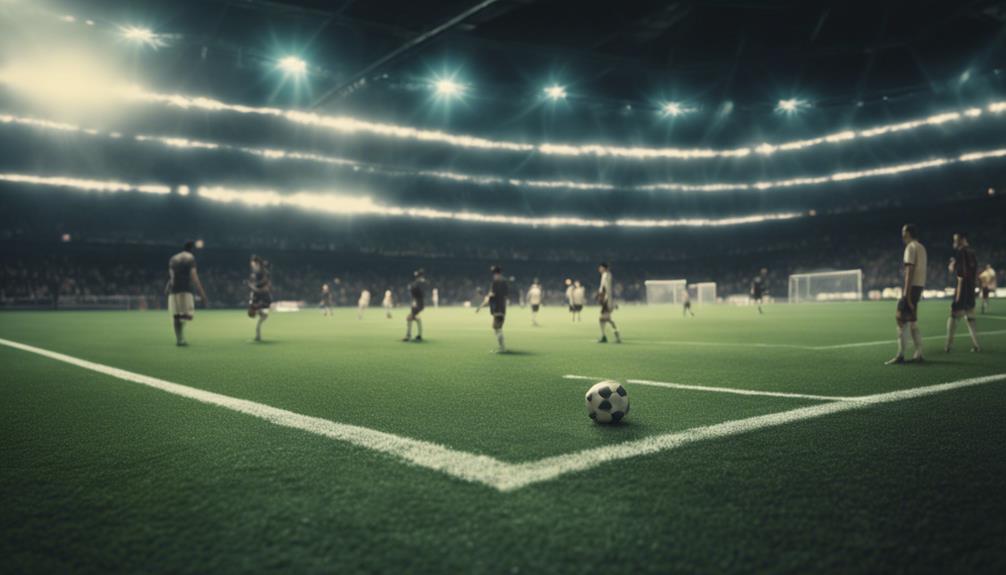
VAR in Soccer: How Video Assistant Referee Is Changing the Game
August 1, 2024If you're curious about how VAR is revolutionizing soccer, the technology is undeniably reshaping the game. Video Assistant Referee fundamentally alters how referees officiate matches, leading to more accurate outcomes. Major European football leagues have used VAR since 2018, enhancing referees' decision-making processes. VAR reduces human errors in critical match situations, influencing game dynamics and impacting player behavior. The statistics on VAR usage reveal an increase in sensible decisions and a decrease in red cards and fouls. The future of VAR in football involves refining processes, gathering feedback, and optimizing technology to guarantee consistency in decision-making.
Impact of VAR Implementation
The implementation of VAR in soccer has fundamentally altered the way referees officiate matches, drastically impacting game dynamics and ensuring more accurate outcomes. Since its introduction by FIFA in 2018, VAR has been used in major European football leagues to review incidents such as goals, penalties, and red cards. This technology has enabled referees to make more informed decisions, leading to a higher level of accuracy in game officiating.
The use of VAR has become essential in modern football, with referees changing their decisions approximately once every 3.29 games on average due to VAR interventions. This shows the significant impact VAR has had on the sport, ensuring fairness and justice on the field. Additionally, VAR has reduced human errors in critical match situations, improving the overall integrity of the game.
Moreover, the integration of goal-line technology alongside VAR has further enhanced the accuracy of officiating, leaving little room for controversies regarding vital goals. Football leagues have embraced these advancements, recognizing the positive impact VAR has had on the sport.
Effects on Game Dynamics
Since the introduction of VAR in soccer, the dynamics of the game have undergone substantial changes, impacting various aspects of gameplay.
The implementation of VAR technology has influenced referee decision-making, resulting in a decrease in the number of red cards and fouls during soccer matches. While VAR interventions have led to an increase in total playing time by an average of 30-120 seconds, the effective playing time has seen a slight decrease due to the review process.
Referees have altered their decisions approximately once every 3.29 games following VAR reviews, showcasing the impact of video footage on game dynamics. For instance, in La Liga, VAR interfered in 27% of games during the 2018-19 season, affecting how matches unfold.
These changes highlight the evolving nature of soccer with VAR in place, as it continues to shape the way games are played and officiated.
Statistics on VAR Usage

VAR has significantly impacted referee decisions and game dynamics in soccer, with notable statistics highlighting its usage.
During the 2018 World Cup, referees' sensible decisions impressively increased from 95% to an remarkable 99.32%, showcasing the positive impact of VAR implementation.
In La Liga's 2018-19 season, VAR intervened in about 27% of matches, indicating its frequent involvement in decision-making processes. It was observed that referees tend to show bias towards better-ranked teams in VAR interventions, raising questions about impartiality.
Despite the improvements in decision-making, the distance covered by players above 21 km/h remained unchanged by VAR, suggesting that player performance at high speeds remains consistent.
However, team dynamics experienced a slight shift as the distance covered by teams slightly decreased due to VAR interventions, showcasing changes in overall gameplay strategies.
These statistics provide valuable insights into how VAR is reshaping soccer matches and influencing various aspects of the game.
Research Findings on VAR
You'll find that the impact of VAR on fouls and its influence on game time are essential research findings in the field of soccer officiating.
These aspects shed light on how VAR is shaping the pace and fairness of matches.
Understanding these points can provide valuable insights into the overall impact of video assistant refereeing in the sport.
VAR Impact on Fouls
Research findings on VAR's impact on fouls in soccer reveal a significant decrease in the number of fouls called since its implementation.
Elite soccer leagues have seen referees becoming more accurate in identifying fouls with the assistance of VAR technology.
The introduction of VAR hasn't only reduced foul-related controversies but also contributed to fairer officiating, positively influencing match outcomes.
Data supports a noticeable decrease in the frequency of fouls called during matches where VAR is utilized.
The VAR impact on fouls has been instrumental in improving the overall accuracy of refereeing decisions and ensuring a more just outcome for teams.
VAR Influence on Time
The impact of VAR on time in soccer matches is a topic that reveals significant changes in playing dynamics and match outcomes. With VAR implementation, there's been an increase in total playing time by an average of 30-120 seconds per match. However, effective playing time has slightly decreased due to more frequent VAR interventions during games. Referees, influenced by VAR reviews, have altered their decisions once every 3.29 games on average, affecting match outcomes.
In La Liga, VAR interfered in approximately 27% of matches during the 2018-2019 season, showcasing its substantial impact on game dynamics. Studies have indicated that VAR hasn't only influenced the referees' decision-making but has also shaped player behavior and ultimately altered the flow and results of matches.
As VAR continues to play an essential role in modern soccer, its influence on playing time and game dynamics remains a topic of interest and debate within the football community.
Future of VAR in Football

Looking ahead, the future of VAR in football holds the promise of further improving officiating standards and enhancing the game's fairness and accuracy. As the evolution of officiating continues, the efficiency of VAR will play a vital role in shaping the game's future.
Here are three key aspects to keep in mind:
- Refining VAR: The ongoing enhancement of VAR processes will focus on reducing interruptions, improving game flow, and upholding the integrity of the sport.
- Long-term Impact: Continued research and evaluation are essential to understanding the long-term influence and effectiveness of VAR in football.
Challenges and Future Directions
You should focus on the future developments of VAR and the evolution of refereeing technology in soccer.
Understanding the challenges and potential improvements in these areas is vital for the advancement of the sport.
Enhancing VAR capabilities and refining officiating tools will shape the future direction of soccer refereeing.
Future VAR Developments
Further advancements in VAR technology and refinement of implementation processes are essential to address challenges and enhance its effectiveness in soccer officiating. In the domain of future VAR developments, the focus is on refining criteria, technology usage, and improving training to elevate the system's performance.
To achieve this, efforts must be directed towards reducing interruptions, enhancing game flow, and minimizing errors to uphold fairness and boost overall refereeing accuracy. Additionally, evaluating VAR's impact on player behavior and game parameters will be vital in shaping its evolution.
By continuously improving technology and training methods, VAR can overcome existing challenges and maximize its potential in revolutionizing soccer officiating.
- Refining VAR criteria and technology usage
- Minimizing interruptions to enhance game flow
Evolving Refereeing Technology
Progressing in the field of refereeing technology poses challenges and opportunities for enhancing soccer officiating. The implementation of Video Assistant Referee (VAR) has significantly impacted the decision-making process in games. VAR's influence is noticeable in the reduction of fouls, offsides, and yellow cards after its introduction in 2018. Referees now have a tool that aids in making more precise calls, ultimately improving the fairness of matches.
However, challenges persist, such as minimizing interruptions to playing time and refining VAR criteria to uphold game flow.
As technology advances, the future of VAR in soccer looks promising. Continued research is essential to fully understand the effects of VAR on game dynamics and the overall officiating experience. Future directions for VAR implementation could focus on optimizing technology usage, especially in different match locations, to ensure uniformity in decision-making. Additionally, considering the goal difference and the impact of red cards could further refine VAR's role in shaping the future of soccer officiating.
Conclusion
As VAR continues to revolutionize the beautiful game of soccer, it brings a touch of excitement and uncertainty to every match.
The implementation of this technology has sparked debates and added a new layer of drama to the sport.
With its growing influence, VAR is reshaping the way we view and analyze football.
Embrace the changes and enjoy the rollercoaster ride of emotions that VAR brings to the game we all love.


